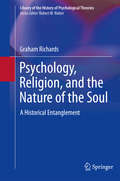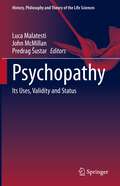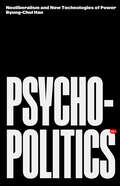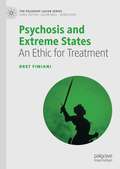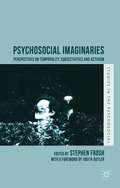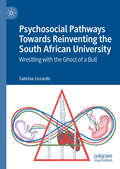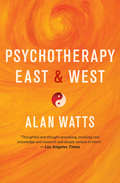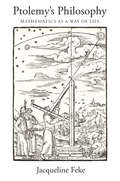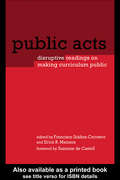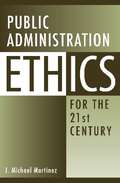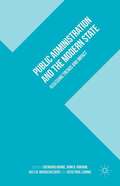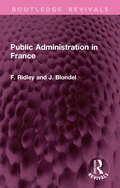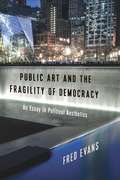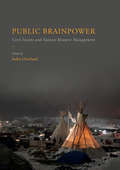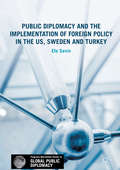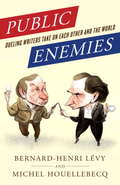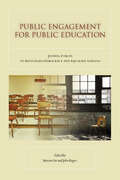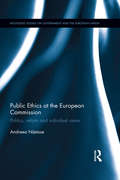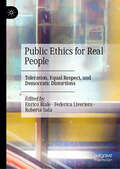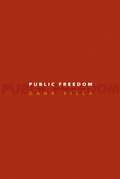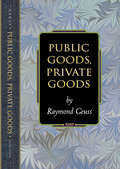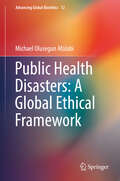- Table View
- List View
Psychology, Religion, and the Nature of the Soul
by Graham RichardsNeither a book about the psychology of spirituality nor America's ongoing turf wars between religion and science, Psychology, Religion, and the Nature of the Soul takes to task many of the presumed relationships between the two--from sharing common concerns to diametrically hostile opposites--to analyze the myriad functions religion and psychology play in our understanding of the human life and mind. Graham Richards takes the historical and philosophical long view in these rigorous and readable essays, which trace three long-running and potentially outmoded threads: that psychology and religion are irrelevant to each other, that they are complementary and should collaborate, and that one will eventually replace the other. He references a stunning variety of texts (from Freud and Allport to Karen Armstrong and Paul Tillich) reflecting the evolution of these ideas over the decades, to emphasize both the complexity of the issues and the enduring lack of easy answers. The eloquence of the writing and passionate objectivity of the argument will interest readers on all sides of the debate as the author examines: the religious origins of psychology, the original dichotomy: mythos versus logos, the authenticity of religious experience, Religion and personality, the problematic role of prayer and Religion in the history of psychotherapy. For those making a serious study of the history of psychology, Psychology, Religion, and the Nature of the Soul will inspire a fresh wave of critical discussion and inquiry.
Psychopathy: Its Uses, Validity and Status (History, Philosophy and Theory of the Life Sciences #27)
by John McMillan Luca Malatesti Predrag ŠustarThis book explains the ethical and conceptual tensions in the use of psychopathy in different countries, including America, Canada, the UK, Croatia, Australia, and New Zealand. It offers an extensive critical analysis of how psychopathy functions within institutional and social contexts. Inside, readers will find innovative interdisciplinary analysis, written by leading international experts. The chapters explore how different countries have used this diagnosis. A central concern is whether psychopathy is a mental disorder, and this has a bearing upon whether it should be used. The book’s case studies will help readers understand the problems associated with psychopathy. Academics and students working in the philosophy of psychiatry, bioethics, and moral psychology will find it a valuable resource. In addition, it will also appeal to mental health professionals working in forensic settings, psychologists with an interest in the ethical implications of the use of psychopathy as a construct and particularly those with a research interest in it.
Psychopolitics: Neoliberalism and New Technologies of Power (Futures)
by Byung-Chul HanExploring how neoliberalism has discovered the productive force of the psycheByung-Chul Han, a star of German philosophy, continues his passionate critique of neoliberalism, trenchantly describing a regime of technological domination that, in contrast to Foucault&’s biopower, has discovered the productive force of the psyche. In the course of discussing all the facets of neoliberal psychopolitics fueling our contemporary crisis of freedom, Han elaborates an analytical framework that provides an original theory of Big Data and a lucid phenomenology of emotion. But this provocative essay proposes counter models too, presenting a wealth of ideas and surprising alternatives at every turn.
Psychosis and Extreme States: An Ethic for Treatment (The Palgrave Lacan Series)
by Bret Fimiani“This brilliant and beautifully written book invokes a radical reorientation of the treatment of psychosis” Juliet Flower MacCannell, Author of Figuring Lacan and The Hysteric’s Guide to the Future Female Subject. “Bret Fimiani's book offers an illuminating presentation of the Lacanian approach to psychosis thanks to his clear style which presents Lacanian concepts with a wonderful accuracy, illustrated by examples from his psychoanalytic practice. The dynamic of his investigation challenges the fear of psychosis with testimonies of lived experiences, the Hearing Voices Network, and analysts who claim the unclaimed intelligence at work in psychosis." Francoise Davoine, co-author of History Beyond Trauma This book advances a theory of transference-in-psychosis with the aim of provoking a change in the way the experience of psychosis is understood and thus, clinically treated. It examines the function of ‘ethics’ in the ‘installation’ of transference in the treatment of psychosis and contends that the aim of the psychoanalytic experience is the creation of a new ethic for the analysand and for the treatment. Beginning from the premise that the body of the psychotic is a site of social contestation, the author draws upon the work of Freud, Lacan, Deleuze & Guattari and Apollon to reframe the problem of the ‘body’ (as an effect of language) and its relation to transference, and ethics, in treating psychosis. It argues that psychosis still has much to teach psychoanalysis about how psychoanalysis must continue to change in order to create/offer an approach that is effective for psychosis (versus neurosis) and provides a comprehensive psychoanalytic theory of psychosis that derives, at its core, from the experience of psychosis itself. The book’s synthesis of clinical and ‘peer model’ principles will provide readers with a way to understand and navigate potential transference impasses often encountered with purely clinical approaches. In doing so it provides a valuable new framework for practitioners and scholars working in clinical psychology, psychoanalysis, philosophy, critical theory, psychiatry and social work.
Psychosocial Imaginaries: Perspectives on Temporality, Subjectivities and Activism (Studies in the Psychosocial)
by Stephen FroshPsychosocial Imaginaries.
Psychosocial Pathways Towards Reinventing the South African University: Wrestling with the Ghost of a Bull
by Sabrina LiccardoThis book proposes a conceptual-empirical framework for exploring forms of continuity and change along psychosocial pathways in South African universities. It illustrates how the psychosocial pathways are grounded in the symbolic narratives and knowledges of young scientists, engineers and architects - all interlocutors in the research from which this book is based. Alala, Mamoratwa, Welile, Odirile, Kaiya, Amirah, Takalani, Nosakhele, Naila, Ambani, Khanyisile, Itumeleng, Ethwasa and Kgnaya provide collective standpoints in the multiplicities within and between the lived lives and told stories of young Black South African women in Science, Technology, Engineering, and Mathematics (STEM) fields. In doing so, this compelling work advances possibilities for demythologising scientific endeavour as a white male achievement and shifting knowledge communities across gendered, racialised, class and national divides.This book presents an innovative narrative methodology, utilising the myth of the Minotaur to examine the state of the university at the heart of the hierarchical labyrinth in “post”-apartheid South Africa. Throughout the work the author wrestles with and self-reflexively highlights her own positionality as a white, middle-class South African woman to examine how this affects the production of this research in ways which serve to preserve the colonial knowledge system. With the rise of the Rhodes Must Fall and Fees Must Fall student movement in South Africa, demanding for the fall of institutionalised racial hierarchies, the author uses the cover image of narrative formations in the spirit of exploration to think with and through undulating networked forms that could possibly forge new psychosocial pathways towards decolonising and reinventing South African universities. This work offers a unique conceptual and methodological resource for students and scholars of psychosocial and narrative theory, as well as those who are concerned about the politics of higher education, both in South Africa and in other contexts around the world.
Psychotherapy East & West
by Alan WattsBefore he became a counterculture hero, Alan Watts was known as an incisive scholar of Eastern and Western psychology and philosophy. In this 1961 classic, Watts demonstrates his deep understanding of both Western psychotherapy and the Eastern spiritual philosophies of Buddhism, Taoism, Vedanta, and Yoga. He examined the problem of humans in a seemingly hostile universe in ways that questioned the social norms and illusions that bind and constrict modern humans. Marking a groundbreaking synthesis, Watts asserted that the powerful insights of Freud and Jung, which had, indeed, brought psychiatry close to the edge of liberation, could, if melded with the hitherto secret wisdom of the Eastern traditions, free people from their battles with the self. When psychotherapy merely helps us adjust to social norms, Watts argued, it falls short of true liberation, while Eastern philosophy seeks our natural relation to the cosmos.
Ptolemy's Philosophy: Mathematics as a Way of Life
by Jacqueline FekeThe Greco-Roman mathematician Claudius Ptolemy is one of the most significant figures in the history of science. He is remembered today for his astronomy, but his philosophy is almost entirely lost to history. This groundbreaking book is the first to reconstruct Ptolemy’s general philosophical system—including his metaphysics, epistemology, and ethics—and to explore its relationship to astronomy, harmonics, element theory, astrology, cosmology, psychology, and theology.In this stimulating intellectual history, Jacqueline Feke uncovers references to a complex and sophisticated philosophical agenda scattered among Ptolemy’s technical studies in the physical and mathematical sciences. She shows how he developed a philosophy that was radical and even subversive, appropriating ideas and turning them against the very philosophers from whom he drew influence. Feke reveals how Ptolemy’s unique system is at once a critique of prevailing philosophical trends and a conception of the world in which mathematics reigns supreme.A compelling work of scholarship, Ptolemy’s Philosophy demonstrates how Ptolemy situated mathematics at the very foundation of all philosophy—theoretical and practical—and advanced the mathematical way of life as the true path to human perfection.
Public Acts: Disruptive Readings on Making Curriculum Public
by Erica R. Meiners Francisco Ibáñez-CarrascoAs this book documents local, specific, and contextualized acts of resistance and offers a detailed analysis of varied forms of public literacies, it functions as a template to inform and inspire resistant practices in diverse communities.
Public Administration Ethics for the 21st Century
by J. Michael MartinezThis volume establishes a foundation for a uniform code of professional ethics for public administrators in the United States. * Four cases of ethical and unethical decision making in context--Nathan Bedford Forrest, William Calley, Adolf Eichmann, and Mary Anne Wright--who resigned in protest over the 2003 invasion of Iraq * Six figures depicting the process of ethical decision making within a public organization * An extensive bibliography listing of the major sources on administrative ethics in print and online * An index of key thinkers and theories involving administrative ethics
Public Administration and the Modern State
by Eberhard BohnePublic sectors throughout the world are facing unprecedented yet similar challenges. On the one hand civil servants have to confront and present solutions to problems as diverse as unsustainable resource consumption and global environmental concerns to the polarization of politics, rapid advances in technology and rising levels of income inequality. On the other, the public sector has to address these problems with fewer resources as governments around the world race to slash funding to the public sector in the wake of the financial crisis. This thought-provoking volume assesses the nature of public administration in the 21st Century and explores the way in which public sectors have adapted in order to confront the daunting challenges faced by governments around the world. Looking at the different levels of public administration from the local to the supranational level, individual chapters consider the civil service in different countries and explore how the public sector facilitates representation and participation and protects the state from crises ranging from terrorist attacks to economic crashes. The picture that develops is that civil services throughout the world, far from being hollowed out as many observers suggest, are responding to their new mandate by becoming an even larger and even more important part government.
Public Administration in Conflict Affected Countries (Governance and Public Management)
by Juraj Nemec Purshottama S ReddyThis book highlights the main factors determining the quality of public administration in conflict affected countries; and assesses to what extent the conflict determines and impacts on the performance of public administration in affected countries. The main value added by this book is confirming the general expectation that there is no direct and universal link between the conflict and public administration performance (and vice-versa). One may need to argue that each country situation differs and specific factors of internal and external environments determine the trends of public administration performance in conflict affected countries. To achieve the overarching goal of the book, sixteen country studies were developed from all relevant continents - America, Africa, Asia and Europe: Bangladesh, Colombia, Croatia, Egypt, Georgia, Iraq, Kosovo, Nigeria, Palestine, Paraguay, Philippines, Serbia, South Africa, Uganda, Ukraine, and Venezuela.
Public Administration in France (Routledge Revivals)
by J. Blondel F. F. RidleyOriginally published in 1964, this book was an important addition to the growing field of comparative government and administration. This book covers the organisation of the French cabinet, the structure and functions of government departments and of local authorities, the civil service, the police, the judiciary and public enterprise. There are also chapters on economic planning, the administration of social services and of the educational system. The book explains the spirit as well as the mechanism of the French administrative system, the principles that underly it and the wider background against which it is set
Public Art and the Fragility of Democracy: An Essay in Political Aesthetics (Columbia Themes in Philosophy, Social Criticism, and the Arts)
by Fred EvansPublic space is political space. When a work of public art is put up or taken down, it is an inherently political statement, and the work’s aesthetics are inextricably entwined with its political valences. Democracy’s openness allows public art to explore its values critically and to suggest new ones. However, it also facilitates artworks that can surreptitiously or fortuitously undermine democratic values. Today, as bigotry and authoritarianism are on the rise and democratic movements seek to combat them, as Confederate monuments fall and sculptures celebrating diversity rise, the struggle over the values enshrined in the public arena has taken on a new urgency.In this book, Fred Evans develops philosophical and political criteria for assessing how public art can respond to the fragility of democracy. He calls for considering such artworks as acts of citizenship, pointing to their capacity to resist autocratic tendencies and reveal new dimensions of democratic society. Through close considerations of Chicago’s Millennium Park and New York’s National September 11 Memorial, Evans shows how a wide range of artworks participate in democratic dialogues. A nuanced consideration of contemporary art, aesthetics, and political theory, this book is a timely and rigorous elucidation of how thoughtful public art can contribute to the flourishing of a democratic way of life.
Public Brainpower
by Indra OverlandThis book examines how civil society, public debate and freedom of speech affect natural resource governance. Drawing on the theories of Robert Dahl, Jurgen Habermas and Robert Putnam, the book introduces the concept of 'public brainpower', proposing that good institutions require: fertile public debate involving many and varied contributors to provide a broad base for conceiving new institutions; checks and balances on existing institutions; and the continuous dynamic evolution of institutions as the needs of society change. The book explores the strength of these ideas through case studies of 18 oil and gas-producing countries: Algeria, Angola, Azerbaijan, Canada, Colombia, Egypt, Iraq, Kazakhstan, Libya, Netherlands, Nigeria, Norway, Qatar, Russia, Saudi, UAE, UK and Venezuela. The concluding chapter includes 10 tenets on how states can maximize their public brainpower, and a ranking of 33 resource-rich countries and the degree to which they succeed in doing so. The Introduction and the chapters 'Norway: Public Debate and the Management of Petroleum Resources and Revenues', 'Kazakhstan: Civil Society and Natural-Resource Policy in Kazakhstan', and 'Russia: Public Debate and the Petroleum Sector' of this book are available open access under a CC BY 4. 0 license at link. springer. com.
Public Choice III
by Dennis C. MuellerThis book represents a considerable revision and expansion of Public Choice II (1989). Six new chapters have been added, and several chapters from the previous edition have been extensively revised. The discussion of empirical work in public choice has been greatly expanded. As in the previous editions, all of the major topics of public choice are covered. These include: why the state exists, voting rules, federalism, the theory of clubs, two-party and multiparty electoral systems, rent seeking, bureaucracy, interest groups, dictatorship, the size of government, voter participation, and political business cycles. Normative issues in public choice are also examined including a normative analysis of the simple majority rule, Bergson-Samuelson social welfare functions, the Arrow and Sen impossibility theorems, Rawls's social contract theory and the constitutional political economy of Buchanan and Tullock.
Public Diplomacy and the Implementation of Foreign Policy in the US, Sweden and Turkey (Palgrave Macmillan Series in Global Public Diplomacy)
by Efe SevinThis book presents a comprehensive framework, six pathways of connection, which explains the impact of public diplomacy on achieving foreign policy goals. The comparative study of three important public diplomacy practitioners with distinctive challenges and approaches shows the necessity to move beyond soft power to appreciate the role of public diplomacy in global politics. Through theoretical discussions and case studies, six pathways of connection is presented as a framework to design new public diplomacy projects and measure their impact on foreign policy.
Public Enemies: Dueling Writers Take On Each Other and the World
by Bernard-Henri Lévy Michel HouellebecqTwo brilliant, controversial authors confront each other and their enemies in an unforgettable exchange of letters. In one corner, Bernard-Henri Lévy, creator of the classic Barbarism with a Human Face, dismissed by the media as a wealthy, self-promoting, arrogant do-gooder. In the other, Michel Houellebecq, bestselling author of The Elementary Particles, widely derided as a sex-obsessed racist and misogynist. What began as a secret correspondence between bitter enemies evolved into a remarkable joint personal meditation by France's premier literary and political live wires. An instant international bestseller, Public Enemies has now been translated into English for all lovers of superb insights, scandalous opinions, and iconoclastic ideas. In wicked, wide-ranging, and freewheeling letters, the two self-described "whipping boys" debate whether they crave disgrace or secretly have an insane desire to please. Lévy extols heroism in the face of tyranny; Houellebecq sees himself as one who would fight little and badly. Lévy says "life does not live" unless he can write; Houellebecq bemoans work as leaving him in such "a state of nervous exhaustion that it takes several bottles of alcohol to get out." There are also touching and intimate exchanges on the existence of God and about their own families. Dazzling, delightful, and provocative, Public Enemies is a death match between literary lions, remarkable men who find common ground, confident that, in the end (as Lévy puts it), "it is we who will come out on top."
Public Engagement for Public Education: Joining Forces to Revitalize Democracy and Equalize Schools
by John Rogers Marion OrrCommunity participation plays a large role in the success or failure of our public schools. This book focuses attention on the problem of inequality in public engagement, considering how race, class, ethnicity, language, and immigration status shape opportunities for engagement. Without the active participation of the public, chances for improving school systems are limited. Without equal opportunity for public engagement, those in the lower reaches of stratified society are left largely on the outside looking in-and that all too easily becomes a self-perpetuating cycle. Public Engagement for Public Educationspeaks to the potential for students, parents, community members, and civic leaders to join forces and create more equitable schooling. Such engagement can expand access to quality educational pathways which in turn paves the way to a stronger voice in society and the promise of the American dream. If segments of society are blocked access to those pathways, the book argues, nothing less than the health of American democracy is at stake.
Public Ethics at the European Commission: Politics, Reform and Individual Views (Routledge Studies on Government and the European Union)
by Andreea NastaseSince the early 2000s, reforms in the area of public ethics have represented a significant part in the European Commission's efforts to improve its internal governance and democratic legitimacy, and address the crisis of public confidence in European integration. This book comprises a study of ethics and public integrity issues in the administrative services of the European Commission. The author traces the reforms implemented in this area since the early 2000s, and asks whether and how they have shaped Commission officials’ thinking about appropriate behaviour in public office. Based on in-depth interviews and the use of vignettes, the book reveals that the influence of ethics regulations is subtle and full of contradictions: while a heightened awareness and discussion of ethical issues exists in the Commission nowadays, the topic is nonetheless often considered as a matter of "common sense". This book breaks new ground as the first analysis of ethics at the level of individual EU officials. It advances a new angle to the study of the Commission as an administrative actor, and sheds light on an important but under-researched component of its efforts to address criticism concerning democratic legitimacy. In the field of administrative ethics, the book tackles research gaps regarding the practice and impact of ethics policies within public organizations. This text will be of key interest to scholars, students and practitioners of EU Studies/Politics, institutional reform, administrative ethics, and more broadly European governance and public policy.
Public Ethics for Real People: Toleration, Equal Respect, and Democratic Distortions
by Federica Liveriero Enrico Biale Roberta SalaThis book develops an innovative paradigm of public ethics that provides a unique insight into three central themes – recognition, social conflicts and democratic distortions – while critically celebrating the work of Anna Elisabetta Galeotti. In honor of her seventieth birthday, this edited collection brings together leading scholars in the field of normative political philosophy to reason upon the main strands of her research. The volume envisages a general paradigm of public ethics to deal with social conflicts that involve structural dynamics and deliberative deficits. While addressing diverse yet interrelated topics, all the contributors demonstrate a commitment to the ideal that, in the construction and reform of social and political institutions, respect for individuals as the makers of their own lives should act as the guiding principle. Against this backdrop, this volume strikes a difficult-to-reach balance between refined theorizing over classical themes of the liberal tradition and the ability to open these classic themes to new strands of research. The collection deals with crucial contemporary challenges to the democratic order, such as democratic backsliding and the breach of social trust, legal and democratic fights over free speech, multicultural clashes in highly diverse societies, and reparation for historical wrongs.
Public Forgetting: The Rhetoric and Politics of Beginning Again (G - Reference, Information and Interdisciplinary Subjects)
by Bradford VivianForgetting is usually juxtaposed with memory as its opposite in a negative way: it is seen as the loss of the ability to remember, or, ironically, as the inevitable process of distortion or dissolution that accompanies attempts to commemorate the past. The civic emphasis on the crucial importance of preserving lessons from the past to prevent us from repeating mistakes that led to violence and injustice, invoked most poignantly in the call of “Never again” from Holocaust survivors, tends to promote a view of forgetting as verging on sin or irresponsibility. In this book, Bradford Vivian hopes to put a much more positive spin on forgetting by elucidating its constitutive role in the formation and transformation of public memory. Using examples ranging from classical rhetoric to contemporary crises like 9/11, Public Forgetting demonstrates how, contrary to conventional wisdom, communities may adopt idioms of forgetting in order to create new and beneficial standards of public judgment concerning the lessons and responsibilities of their shared past.
Public Freedom
by Dana VillaThe freedom to take part in civic life--whether in the exercise of one's right to vote or congregate and protest--has become increasingly less important to Americans than individual rights and liberties. In Public Freedom, renowned political theorist Dana Villa argues that political freedom is essential to both the preservation of constitutional government and the very substance of American democracy itself. Through intense close readings of theorists such as Hegel, Tocqueville, Mill, Adorno, Arendt, and Foucault, Villa diagnoses the key causes of our democratic discontent and offers solutions to preserve at least some of our democratic hopes. He demonstrates how Americans' preoccupation with a market-based conception of freedom--that is, the personal freedom to choose among different material, moral, and vocational goods--has led to the gradual erosion of meaningful public participation in politics as well as diminished interest in the health of the public realm itself. Villa critically examines, among other topics, the promise and limits of civil society and associational life as sources of democratic renewal; the effects of mass media on the public arena; and the problematic but still necessary ideas of civic competence and democratic maturity. Public Freedom is a passionate and insightful defense of political liberties at a moment in America's history when such freedoms are very much at risk.
Public Goods, Private Goods (Princeton Monographs in Philosophy #11)
by Raymond GeussMuch political thinking today, particularly that influenced by liberalism, assumes a clear distinction between the public and the private, and holds that the correct understanding of this should weigh heavily in our attitude to human goods. It is, for instance, widely held that the state may address human action in the ''public'' realm but not in the ''private.'' In Public Goods, Private Goods Raymond Geuss exposes the profound flaws of such thinking and calls for a more nuanced approach. Drawing on a series of colorful examples from the ancient world, he illustrates some of the many ways in which actions can in fact be understood as public or private. The first chapter discusses Diogenes the Cynic, who flouted conventions about what should be public and what should be private by, among other things, masturbating in the Athenian marketplace. Next comes an analysis of Julius Caesar's decision to defy the Senate by crossing the Rubicon with his army; in doing so, Caesar asserted his dignity as a private person while acting in a public capacity. The third chapter considers St. Augustine's retreat from public life to contemplate his own, private spiritual condition. In the fourth, Geuss goes on to examine recent liberal views, questioning, in particular, common assumptions about the importance of public dialogue and the purportedly unlimited possibilities humans have for reaching consensus. He suggests that the liberal concern to maintain and protect, even at a very high cost, an inviolable ''private sphere'' for each individual is confused. Geuss concludes that a view of politics and morality derived from Hobbes and Nietzsche is a more realistic and enlightening way than modern liberalism to think about human goods. Ultimately, he cautions, a simplistic understanding of privacy leads to simplistic ideas about what the state is and is not justified in doing.
Public Health Disasters: A Global Ethical Framework (Advancing Global Bioethics #12)
by Michael Olusegun AfolabiThis book presents the first critical examination of the overlapping ethical, sociocultural, and policy-related issues surrounding disasters, global bioethics, and public health ethics. These issues are elucidated under the conceptual rubric: Public health disasters (PHDs). The book defines PHDs as public health issues with devastating social consequences, the attendant public health impacts of natural or man-made disasters, and latent or low prevalence public health issues with the potential to rapidly acquire pandemic capacities. This notion is illustrated using Ebola and pandemic influenza outbreaks, atypical drug-resistant tuberculosis, and the health emergencies of earthquakes as focal points. Drawing on an approach that reckons with microbial, existential, and anthropological realities; the book develops a relational-based global ethical framework that can help address the local, anthropological, ecological, and transnational dynamics of the ethical issues engendered by public health disasters. The book also charts some of the critical roles that relevant local and transnational stakeholders may play in translating the proposed global ethical framework from the sphere of concept to the arena of action. This title is of immense benefit to bioethics scholars, public and global health policy experts, as well as graduate students working in the area of global health, public health ethics, and disaster bioethics.
